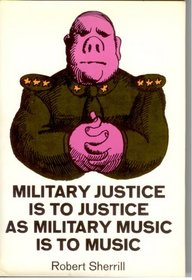This is a very unsettling book to read, especially as I, based on my own experience, know it has some truth in it. I entered the U.S. Marines as a Reserve officer. Within a year, due to my performance, I was offered a Regular commission and accepted it. Three years later, I resigned that commission. I had many reasons for doing so, not just based on how I saw people treated.
I saw numerous cases of Americans treated as the 'enemy' by their own officers. Many received judicial punishment for no other reason than they 'annoyed' officers or senior NCOs. In a few cases, I put my own career on the line to assist individuals who I knew were being 'ramrodded' by the system. I expected to be 'punished' for this and was. In one case, even though 10 lieutenants were eligible to stand Officer of the Day, I stood it every three days for several months. In another case, I had two officers, whose vendetta I had interfered with, plan to entrap me. Fortunately, an enlisted Marine had overheard them and warned me ahead of time, so I could plan my response to their plan.
The book covers the period of the 1960s and early 1970s. This was the time I also served. It was also a bad time to be in the military, as 'standards' were very relaxed as to the selection and retention of officers and senior NCOs. My hope is that the system has changed, or rather learned the truth, that American men and women will serve their country faithfully if they are provided with good leadership.
At the same time, I understand the author has a point to make and his attitude toward military service is not the same as mine. And, while I was proud to serve my country, I was not always proud of the way some others served it. My attitude toward leadership often conflicted with the attitudes of other officers. Sometimes I wondered if other officers I observed realized slavery was declared illegal by a constitutional amendment in 1866.
I saw numerous cases of Americans treated as the 'enemy' by their own officers. Many received judicial punishment for no other reason than they 'annoyed' officers or senior NCOs. In a few cases, I put my own career on the line to assist individuals who I knew were being 'ramrodded' by the system. I expected to be 'punished' for this and was. In one case, even though 10 lieutenants were eligible to stand Officer of the Day, I stood it every three days for several months. In another case, I had two officers, whose vendetta I had interfered with, plan to entrap me. Fortunately, an enlisted Marine had overheard them and warned me ahead of time, so I could plan my response to their plan.
The book covers the period of the 1960s and early 1970s. This was the time I also served. It was also a bad time to be in the military, as 'standards' were very relaxed as to the selection and retention of officers and senior NCOs. My hope is that the system has changed, or rather learned the truth, that American men and women will serve their country faithfully if they are provided with good leadership.
At the same time, I understand the author has a point to make and his attitude toward military service is not the same as mine. And, while I was proud to serve my country, I was not always proud of the way some others served it. My attitude toward leadership often conflicted with the attitudes of other officers. Sometimes I wondered if other officers I observed realized slavery was declared illegal by a constitutional amendment in 1866.




